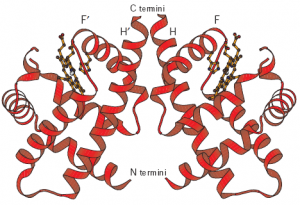Two scientists from Illinois Institute of Technology (IIT), Ben Stark and Tony Sanny, have received a patent for a method to genetically engineer bacteria and yeast to increase bioethanol production. During the development process, the team focused on cellulosic biomass from twigs, branches, plant stalks, husks and woodschips.
 This patent is Stark’s, who is a professor of biology, and Sanny’s, a former Ph.D. student and now a partner with Swanson & Bratschun, third since 2014 for increasing bioethanol production by genetic engineering of microorganisms to express Vitreoscilla hemoglobin.
This patent is Stark’s, who is a professor of biology, and Sanny’s, a former Ph.D. student and now a partner with Swanson & Bratschun, third since 2014 for increasing bioethanol production by genetic engineering of microorganisms to express Vitreoscilla hemoglobin.
The team developed a method to genetically engineer Escherichia coli and Zymomonas mobilis, two bacterial ethanol producers, and yeast, a eukaryotic ethanol producer, to express Vitreoscilla hemoglobin (VHb). Engineering of microorganisms with VHb has been shown to enhance the production of many useful bioproducts as well as improve microbial degradation of certain toxic chemicals. Physical addition of small amounts of oxygen to ethanol producing cultures has been shown by others to enhance bioethanol production; the Illinois Tech (VHb) approach is a biological correlate of the physical method, and so works on its own without the need for an oxygen feed to the growth chamber.
According to the researchers, cellulosic and hemicellulosic-based bioethanols are the least common right now, because these polymers are fairly difficult to break down into their component sugars, thus making it difficult to produce enough fuel-grade ethanol cost-effectively. However, bioethanol from these feedstocks has the promise of being much more cost effective and sustainable, producing less greenhouse gas, and having a less direct impact on the food supply than using corn starch as a source of sugar. Work in recent years has focused on genetically modifying yeast and other materials used in producing bioethanol from cellulose and hemicellulose to speed the breakdown process, improve yields, and lower costs.

